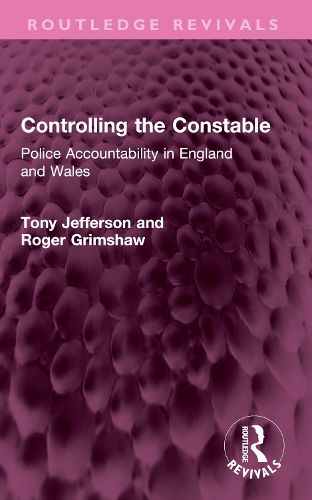Readings Newsletter
Become a Readings Member to make your shopping experience even easier.
Sign in or sign up for free!
You’re not far away from qualifying for FREE standard shipping within Australia
You’ve qualified for FREE standard shipping within Australia
The cart is loading…






In the early 1980s, the question of how far the police should be accountable for their actions had become extremely vexed. The impending new Police Bill, the Scarman report and the pressure from many sides for an independent complaints machinery hinged on this issue, and a careful review of the problem was badly needed.
The Cobden Trust commissioned Tony Jefferson and Roger Grimshaw to research into the matter, and Controlling the Constable, originally published in 1984, is the result of their findings. The authors examine closely the concept of constabulary independence at the time. They look at the relevant legal history and at how this independence was used by chief constables from day to day. On this basis, they then re-assess two of the most controversial policing operations of modern times - Brixton prior to the 1981 Riots and Southall on 23 April 1979, a day which resulted in hundreds of arrests and the death of Blair Peach.
They conclude that the concept embodies a fundamental incoherence: the reliance on the law to guide the chief constable, and the failure of the law to do so. They show that all the current proposals for reform, which entailed greater emphasis on the democratic system as a guide, could result in similar incoherence. A new approach to the conflict between legal authority and democratic authority was urgently needed. Controlling the Constable points the way to the only satisfactory resolution - and this included a concept of justice which was coherent and which could serve as a real guide for the chief constable in using his discretion. The book was controversial, but quite clear on one point: however independent any new complaints procedure may become, and however much committees were 'consulted' by chief constables via 'Scarman-type' liaison committees, until the problem was tackled on this fundamental level, there could be no significant change in police behaviour.
$9.00 standard shipping within Australia
FREE standard shipping within Australia for orders over $100.00
Express & International shipping calculated at checkout
In the early 1980s, the question of how far the police should be accountable for their actions had become extremely vexed. The impending new Police Bill, the Scarman report and the pressure from many sides for an independent complaints machinery hinged on this issue, and a careful review of the problem was badly needed.
The Cobden Trust commissioned Tony Jefferson and Roger Grimshaw to research into the matter, and Controlling the Constable, originally published in 1984, is the result of their findings. The authors examine closely the concept of constabulary independence at the time. They look at the relevant legal history and at how this independence was used by chief constables from day to day. On this basis, they then re-assess two of the most controversial policing operations of modern times - Brixton prior to the 1981 Riots and Southall on 23 April 1979, a day which resulted in hundreds of arrests and the death of Blair Peach.
They conclude that the concept embodies a fundamental incoherence: the reliance on the law to guide the chief constable, and the failure of the law to do so. They show that all the current proposals for reform, which entailed greater emphasis on the democratic system as a guide, could result in similar incoherence. A new approach to the conflict between legal authority and democratic authority was urgently needed. Controlling the Constable points the way to the only satisfactory resolution - and this included a concept of justice which was coherent and which could serve as a real guide for the chief constable in using his discretion. The book was controversial, but quite clear on one point: however independent any new complaints procedure may become, and however much committees were 'consulted' by chief constables via 'Scarman-type' liaison committees, until the problem was tackled on this fundamental level, there could be no significant change in police behaviour.